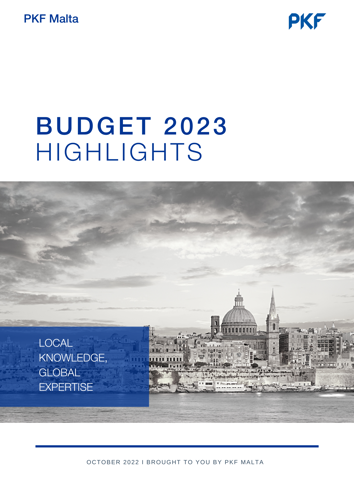Malta Budget Highlights 2023
|
Authors: Advisory team PKF Malta On the 24th of October, the Minister for Finance and Employment, Hon. Clyde Caruana delivered his second budgetary speech as he presented the 2023 budget, entitled “Certainty and Stability”. As indicated by the title, the budget focused on conveying a message of stability during a highly turbulent economic period. Amidst the geo-political turmoil associated with the Russian invasion of Ukraine, the Maltese economy has performed relatively well when compared to the rest of Europe. In the first half of 2022, Malta recorded annual real GDP growth of 8.5%, as employee compensation grew 8% from the previous year. Nonetheless, due to the high energy prices, supply chain disruptions as well as persistent rises in aggregate demand, inflation has increased significantly. In his budgetary speech, the Finance Minister focused on the government’s willingness to protect businesses and the private sector in general from incurring significant increases in their utility bills in order to retain their external competitiveness. Given that it is unlikely that energy prices will return to their pre-pandemic levels in the foreseeable future, the government intends to keep water and electricity bills unchanged, offsetting the increase in energy costs from public funds. As expected, due to the rising inflation, the announced €9.90 weekly cost of living adjustment (COLA), was more than three times of the 2000-2021 average (€3.10). |
|
 |
Furthermore, the 2023 budget included various incentives to diversify the aggregate business portfolio of Maltese enterprises, aiming to minimise the impact of international volatility on local prices. More specifically, a brand named ‘Start in Malta’ will be introduced, serving as a one-stop shop to start-ups while a new business incubation centre will be developed through EU funding for innovative start-ups. In addition, the Micro Invest scheme will be further extended such that social enterprises will be eligible for a maximum €70,000 tax refund over three years. In terms of transport, the government has also extended the schemes incentivizing the purchase of various electric vehicles, ranging from motorcycles and mopeds to pedal electric cycles and motorised bicycles. Looking ahead, the Finance Minister claimed that the Maltese economy is expected to maintain the positive momentum in the second half of 2022 into 2023. Real economic growth is expected to slow down from 6% to 3.5% in 2023. Employment growth is forecasted to stand at 3.4% in the upcoming year, such that unemployment should hover around 3.1%. Inflation is also expected to slow down from 5.7% in 2022 to 3.7% in 2023. When addressing the sustainability of public finances, the Finance Minister claimed that the fiscal deficit as a percentage of the GDP is expected to decline from 5.8% in 2022 to 5.5% in 2023. Our team of economists have the pleasure of providing a summarised version of the salient points emanating from this year’s budget. We invite you to stay up to date with our socials and website on www.pkfmalta.com for more economic insights and analysis concerning next years’ budget. Authors: Advisory team PKF Malta |
